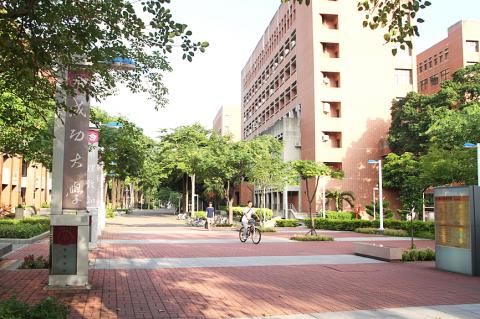Chinese students applying to study at National Cheng Kung University (NCKU) were reportedly denied travel documents by Chinese authorities, who say the institution supports Taiwanese independence.
A document seen on social media on Friday reportedly issued by China’s Taiwan Affairs Office (TAO) asked secondary schools to advise students applying to study in Taiwan to reconsider their decision, as the cross-strait relationship is “tight, complex and sensitive.”
“It is regrettable if the document is official,” Mainland Affairs Council Deputy Minister Chiu Chui-cheng (邱垂正) said, adding that China should not impede or restrict applications to study in Taiwan.

Photo: CNA
TAO spokesman Ma Xiao-guang (馬曉光) yesterday said that his agency was doing its job by reminding students of the current cross-strait situation.
Ministry of Education Department of International and Cross-strait Education Director-General Bi Tzu-an (畢祖安) said he noticed similar information spreading, mainly from China’s Fujian and Jiangsu provinces.
The nation’s policies regarding cross-strait education links have been eased in recent years, creating a friendly environment for Chinese students, Bi said.
The department has been communicating with its counterpart in China, expressing its hope that Beijing would not issue such “reminders,” because they might affect interactions among young people from both sides, he said.
Meanwhile, a Chinese student said his application for travel documents to study in Taiwan was denied by the Chinese government because National Cheng Kung University, to which he applied, was identified as a supporter of Taiwanese independence.
Many other students from Fujian, Jiangsu and Hubei provinces, as well as some in Beijing, received calls from the TAO either advising against or forbidding them from studying at Taiwanese universities, the student said.
Chinese students applying to study at National Chengchi University, National Tsing Hua University or National Chiao Tung University reported receiving such calls, but those applying for Cheng Kung University were particularly targeted, reports said.
Nonetheless, another student from Guangzhou seeking to enroll at Cheng Kung University said they obtained travel documents without issue.
National Cheng Kung University secretary-general Lee Ching-chang (李俊璋) denied that the university is involved in any activities supporting Taiwanese independence.
“The university welcomes all students who have passed the exams, whether they are Taiwanese or not,” Lee said.
If a non-Taiwanese student fails to finish the registration procedure by the deadline, the university would consider their situation and might reserve their position for one year, he said.

NATIONAL SECURITY THREAT: An official said that Guan Guan’s comments had gone beyond the threshold of free speech, as she advocated for the destruction of the ROC China-born media influencer Guan Guan’s (關關) residency permit has been revoked for repeatedly posting pro-China content that threatens national security, the National Immigration Agency said yesterday. Guan Guan has said many controversial things in her videos posted to Douyin (抖音), including “the red flag will soon be painted all over Taiwan” and “Taiwan is an inseparable part of China,” while expressing hope for expedited “reunification.” The agency received multiple reports alleging that Guan Guan had advocated for armed reunification last year. After investigating, the agency last month issued a notice requiring her to appear and account for her actions. Guan Guan appeared as required,

DAREDEVIL: Honnold said it had always been a dream of his to climb Taipei 101, while a Netflix producer said the skyscraper was ‘a real icon of this country’ US climber Alex Honnold yesterday took on Taiwan’s tallest building, becoming the first person to scale Taipei 101 without a rope, harness or safety net. Hundreds of spectators gathered at the base of the 101-story skyscraper to watch Honnold, 40, embark on his daredevil feat, which was also broadcast live on Netflix. Dressed in a red T-shirt and yellow custom-made climbing shoes, Honnold swiftly moved up the southeast face of the glass and steel building. At one point, he stepped onto a platform midway up to wave down at fans and onlookers who were taking photos. People watching from inside

A Vietnamese migrant worker yesterday won NT$12 million (US$379,627) on a Lunar New Year scratch card in Kaohsiung as part of Taiwan Lottery Co’s (台灣彩券) “NT$12 Million Grand Fortune” (1200萬大吉利) game. The man was the first top-prize winner of the new game launched on Jan. 6 to mark the Lunar New Year. Three Vietnamese migrant workers visited a Taiwan Lottery shop on Xinyue Street in Kaohsiung’s Gangshan District (崗山), a store representative said. The player bought multiple tickets and, after winning nothing, held the final lottery ticket in one hand and rubbed the store’s statue of the Maitreya Buddha’s belly with the other,

‘NATO-PLUS’: ‘Our strategic partners in the Indo-Pacific are facing increasing aggression by the Chinese Communist Party,’ US Representative Rob Wittman said The US House of Representatives on Monday released its version of the Consolidated Appropriations Act, which includes US$1.15 billion to support security cooperation with Taiwan. The omnibus act, covering US$1.2 trillion of spending, allocates US$1 billion for the Taiwan Security Cooperation Initiative, as well as US$150 million for the replacement of defense articles and reimbursement of defense services provided to Taiwan. The fund allocations were based on the US National Defense Authorization Act for fiscal 2026 that was passed by the US Congress last month and authorized up to US$1 billion to the US Defense Security Cooperation Agency in support of the